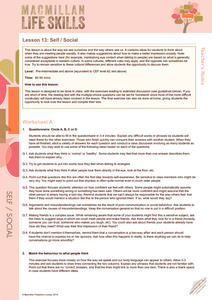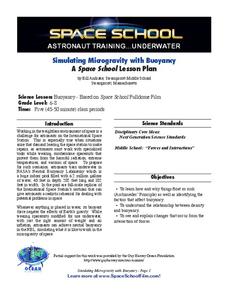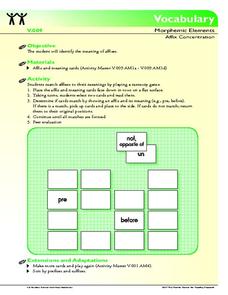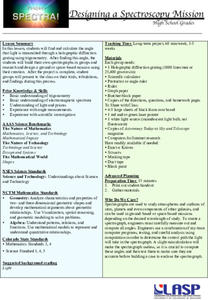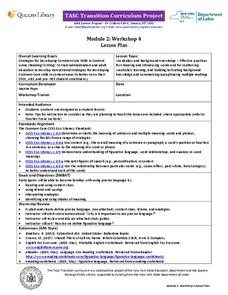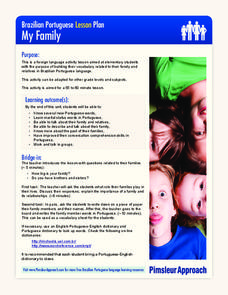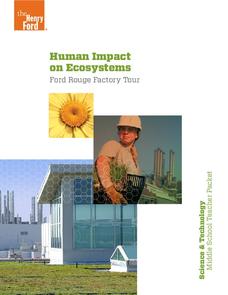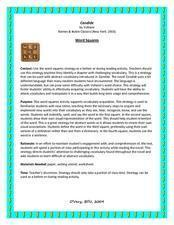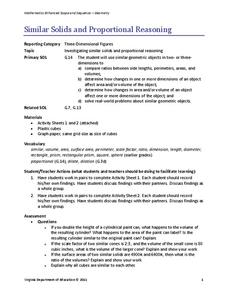Macmillan Education
Skills and Attitudes
What kinds of skills and attitudes are valued in a work environment? Using this set of worksheets and collaborative activities, your pupils will develop important life skills and consider what is necessary for getting and keeping a job.
Resources for Early Childhood
Making Math Meaningful and Enjoyable
Your young learners will enjoy mathematics that is meaningful correspondence as they play their way to a deep mathematical foundation. Organized around the math standards, this appropriate sequence of conceptual, preschool...
ESL Kid Stuff
Parts of the Body
Eyes and ears and mouth and nose! Practice the names of body parts with a lesson based on the song "Head, Shoulders, Knees and Toes". Kids sing the song and read a story with the same vocabulary words before finishing a worksheet to...
Montana State University
Meet Mount Everest
Learning about one landform might seem boring to some, but using the resource provided practically guarantees scholar interest. The second in a sequential series of eight covering the topic of Mount Everest includes activities such as a...
Virginia Department of Education
Average Atomic Masses
Facilitate learning by using small objects to teach the principles of atomic mass in your science class. Pupils determine the average mass of varying beans as they perform a series of competitive experiments. They gather data and...
Macmillan Education
Self/Social
Body language, our perception of others, and how to make a better impression socially are the focus topics for this lesson plan, which is part of a 23-lesson plan series on building important life skills. Learners complete a...
Florida International University
Simulating Microgravity with Buoyancy
How do astronauts know how to live and work in a weightless environment? It doesn't come naturally! Junior physicists conduct experiments to examine the link between buoyancy and microgravity. Each activity illustrates a different aspect...
MENSA Education & Research Foundation
Roller Coaster Mania!
Raise the energy level of your physical science class with this exciting hands-on activity. Applying their knowledge of kinetic and potential energy and Newton's laws of motion, young engineers use foam tubing and marbles to create...
Florida Center for Reading Research
Vocabulary: Morphemic Elements, Affix Concentration
Ask your class to concentrate their energy on affixes! Pupils match various affixes to their meanings in a memory-style game until all the cards have been gathered.
Foundation for Water & Energy Education
What is the Water Cycle? Activity B
Curious physical scientists follow a lesson plan on the properties of water with this lesson plan on distillation. They observe a miniature water cycle model that filters dirty water into clean water. These two lessons combined are an...
EngageNY
Asking and Answering Questions: Reading about a Frog's Habitat
Building upon previous lessons, scholars take to asking and answering questions about a frog's habitat. A partner discussion follows a read-aloud of an informational text in preparation for a worksheet that boosts reading comprehension...
National Nanotechnology Infrastructure Network
Big vs. Little - Macro to Micro Lesson 1
Small and large are relative terms; what's the best way to quantify them? Young scientists take on that challenge as they complete an interactive activity to explore size. They build structures during their exploration and begin using...
University of Colorado
Designing a Spectroscopy Mission
Design a mission over the rainbow. Small groups spend several weeks together determining a mission related to spectroscopy. The teams build spectrographs and analyze the design to determine whether it will carry out the mission. At the...
New York State Education Department
TASC Transition Curriculum: Workshop 4
Why is it important to use precise language? Participants explore this question in the fourth activity in a series of 15 on effective instruction. Perfect for all content areas, the activity promotes appropriate language choice through...
Pimsleur
My Family
Ensure that your learners can describe their families using Portuguese by following the steps provided here and using the included worksheets and assessments for reinforcement. After a brief introductory activity, learners complete...
Teach Engineering
Earthquakes Living Lab: FAQs about P Waves, S Waves and More
Let's talk about earthquakes .... Using the Internet, pupils research what causes earthquakes, how scientists measure them, their locations, and their effects. The resource is not only informative, but it also builds crucial research...
California Department of Education
In the Interview Hot Seat
Interviews can be so stressful. How does someone stay calm and confident in the interview hot seat? Senior job seekers get acquainted with common interview questions during the fifth of six career and college readiness lessons....
Visa
Money Matters: Why It Pays to Be Financially Responsible
What does it mean to be financially responsible? Pupils begin to develop the building blocks of strong financial decision making by reviewing how their past purchases are examples of cost comparing, cost-benefit analysis, and budgeting.
North Carolina State University
Exploring Genetics Across the Middle School Science and Math Curricula
Where is a geneticist's favorite place to swim? A gene pool. Young geneticists complete hands-on activities, experiments, and real-world problem solving throughout the unit. With extra focus on dominant and recessive genes, Punnett...
Henry Ford Museum
Human Impact on Ecosystems
An environmenta science unit includes three lessons plus a cumulative project covering the ecosystem. Scholars follow the history of the Ford Rouge Factory from its construction on wetlands and how it destroyed the environment to its...
American Press Institute
Introductory News Literacy
Aspiring journalists learn about media literacy, journalism, and the press. Units come complete with handouts, assignment rubrics, notes, and extension suggestions. Each unit also comes with a list of vocabulary words and learning...
Montana State University
What's the Weather?
How many jackets do you need to stay warm and climb Mount Everest? An informatie resource covers the topic of Mount Everest, the resource helps young scientists discover the difference between climate and weather. Activities include...
Curated OER
Candide: Word Squares
Readers of Voltaire’s satire create a word square for vocabulary drawn from Candide. The first box contains the word, the second a picture or illustration of the word. The definition is written in the third box, and learners write a...
Virginia Department of Education
Similar Solids and Proportional Reasoning
Double the dimensions, quadruple the surface area. Pairs build similar prisms and compare the ratios of their surface areas and volumes to the ratio of the heights. Given two similar cones, partners determine the ratios of the lateral...







